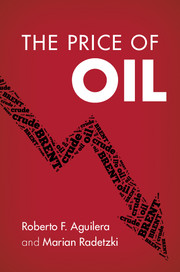Book contents
- Frontmatter
- Contents
- Figures
- Tables
- Acknowledgments
- 1 Introduction and overview
- PART I OIL'S EXTRAORDINARY PRICE HISTORY: HOW CAN IT BE EXPLAINED?
- 2 The price of oil since the early 1970s: observations and implications
- 3 OPEC and its behavior cannot explain oil's price performance
- 4 Can depletion and rising costs explain the price developments?
- 5 State ownership, government greed and the slowdown of capacity expansion
- 6 The resource curse and capacity destruction
- PART II THE SHALE AND CONVENTIONAL OIL REVOLUTIONS: LOW PRICES AHEAD
- PART III GLOBAL IMPLICATIONS FOR THE MACROECONOMY, THE ENVIRONMENT AND FOR POLITICS
- CONCLUSIONS
- References
- Index
6 - The resource curse and capacity destruction
from PART I - OIL'S EXTRAORDINARY PRICE HISTORY: HOW CAN IT BE EXPLAINED?
Published online by Cambridge University Press: 05 November 2015
- Frontmatter
- Contents
- Figures
- Tables
- Acknowledgments
- 1 Introduction and overview
- PART I OIL'S EXTRAORDINARY PRICE HISTORY: HOW CAN IT BE EXPLAINED?
- 2 The price of oil since the early 1970s: observations and implications
- 3 OPEC and its behavior cannot explain oil's price performance
- 4 Can depletion and rising costs explain the price developments?
- 5 State ownership, government greed and the slowdown of capacity expansion
- 6 The resource curse and capacity destruction
- PART II THE SHALE AND CONVENTIONAL OIL REVOLUTIONS: LOW PRICES AHEAD
- PART III GLOBAL IMPLICATIONS FOR THE MACROECONOMY, THE ENVIRONMENT AND FOR POLITICS
- CONCLUSIONS
- References
- Index
Summary
WHAT IS THE RESOURCE CURSE?
The resource curse, according to its proponents (Sachs and Warner, 1999; Auty, 2001; Gylfason, 2002), is a malaise afflicting economies heavily dependent on the fossil fuels and minerals sectors. Such dependency, it is claimed, slows economic growth and social progress compared with that of other countries at corresponding levels of economic development. This finding is particularly relevant to oil, since high dependence on oil in a national economy is much more common than dependence on minerals, given the exceptional value of oil production and oil trade among commodities (Table 1.1; also see Radetzki, 2008).
The view that a high national dependence on oil or mineral extraction retards economic growth is not undisputed. Thus, Davis (1995) compares 22 fossil fuel and mineral economies with 57 non-mineral ones in the third world between 1970 and 1991 to conclude that the former performed much better both in terms of per capita growth and of the human development index. Maddison's (1994) monumental study, covering 1913–1950, concludes that resource rich countries like Canada, Finland, Sweden, the US and Latin America as a whole had much faster growth than resource poor ones; e.g., Japan, Korea and Asia more generally. Maxwell (2004) adds Chile after 1980 to the successful high-growth mineral economies. Among the skeptics, Wright and Czelusta (2004) may have hit the head of the nail in the title to their study on the subject “The myth of the resource curse.”
A number of purported arguments are advanced in support of the claim that oil- and mineral-rich countries exhibit inferior development performance. One is the disturbance caused by instability of the volatile oil and mineral markets. Another is the painful and costly need for macroeconomic rebalancing to counter the detriments of extreme dualism following from resource riches. The economics profession has even baptized this problem as the “Dutch Disease,” where the rich natural resource sector bids away labor and capital, increasing their price in the process, while the trade surplus generated by resource exports results in an appreciating currency. The consequence is reduced competitiveness and shrinkage of all non-resource tradable sectors. In the extreme, this results in the emergence of a monoeconomy, completely dominated by the resource activity.
- Type
- Chapter
- Information
- The Price of Oil , pp. 59 - 78Publisher: Cambridge University PressPrint publication year: 2015



